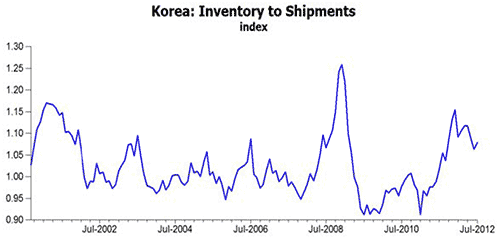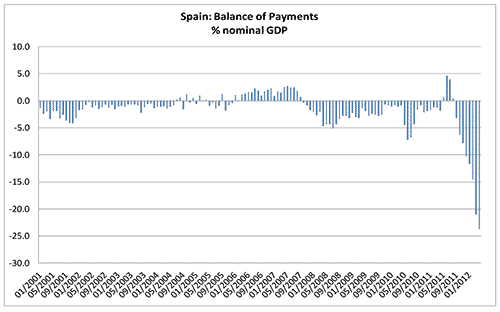Another Calm Before the Storm?
Tyndall Monthly Commentary: Financial markets are back to some of their bad habits, giving them an artificial boost and causing a disconnect with the real economy. It looks like 2006 all over again.
Tuesday, October 2nd 2012, 1:38PM
by Andrew Hunt

It almost seems remarkable that many equity markets – admittedly with a few notable exceptions such as China – are up year to date despite the onset of a deep recession in global trade, the continuing crisis that is occurring within the Euro and even the US’s apparent inability to achieve what some might regard as an ‘escape velocity’ in its recovery from the Global Financial Crisis. In fact, in each country or region, we find that there is a remarkably common factor constraining their recoveries, namely a lack of real income generation or underlying productivity growth but despite this ‘problem’, financial markets have generally prospered. Indeed, one could almost be forgiven for believing that the asset markets are occupying a very different world than the real sectors of the economy, given their obvious divergent experiences so far this year.
Certainly, the optimism with regard to the outlook for the real economies that prevailed in many places during the first quarter of this year has been proved to have been ill-founded. In fact, we suspect that this optimism, which was largely fostered by the media and the financial markets themselves, may actually have done harm to the global economy by encouraging companies to increase employment and production in anticipation of a revival in global demand that simply was not likely to – and did not – materialise. Hence, particularly in Europe and Asia, this increased production went unsold and companies now have significant levels of goods that they cannot dispose of in the still weak current environment. Consequently, production, employment and trade trends have weakened around the world as companies have sought to adjust their bloated inventory levels and ratios.

In Asia, we suspect that the situation has been made particularly severe by the sharp slowdown that has beset China this year. Despite the message offered by the official data, we calculate that Chinese industrial production may actually have fallen so far this year as a result of the country’s sluggish export performance and more importantly the ending of the local government infrastructure spending boom that had propelled the overwhelming majority of China’s growth since 2008. China’s authorities have had no option but to slow this boom since it had long since become both inflationary and distorting to the overall economy. There are also suggestions that the growing financial autonomy of the regional governments was viewed as a potential political threat to the communist state by the incoming government and hence the local government boom has been reined in, in places quite severely.
In time, China will of course be able to ease its stance and to restart its economy, but we suspect that we may be some way into 2013 before the underlying rate of inflation is low enough, and the external balance of payments position strong enough, to allow the domestic authorities sufficient policy leeway to ease their stance. Hence, China growth plays both domestically and abroad may continue to struggle, at least in a fundamental sense.
The situation in China with regard to global economy is not all bad news however, since the high inflation and political situation has triggered what might be described as a wave of Chinese capital exports, which have acted as a supporting factor in both global financial markets and, most notably of all, the US and other countries’ property markets. The impact of these flows should not be underestimated.
On the other side of the world, the Euro Crisis drags on, in part because many of the underlying problems are intractable and in part because the proffered policy responses have either been inadequate or at times counterproductive. For example, the much lauded “LTROs” of the first quarter of this year that were supposed to save the Euro may have succeeded in stabilising peripheral bond markets for six or seven weeks but, by restoring two way trading to these markets. The LTROs inadvertently allowed large quantities of foreign capital to exit the periphery’s debt markets and their banking systems, thereby creating some of the largest balance of payments deficits that have ever been recorded. These balance of payments deficits then had to be financed by yet more expensive action from the ECB and more particularly by the core countries, a role that we suspect that they are now tiring of fulfilling.

Meanwhile, seemingly invisible to the financial markets, the economic situation within the Euro Zone continues to deteriorate with even Germany now slowing quite rapidly and the ECB so far has had little new to offer except promises of what at the end of the day amount to yet more dangerous and potentially unworkable LTRO type strategies. We therefore expect the Euro Crisis to continue for the remainder of the year and we continue to suspect that there is quite a high probability that the Euro will be reconstituted over the long year end bank holiday.
There is however some pieces of good news still left in the global economy. For example, although Japan’s industrial sector is clearly weakening under the onslaught of the strong yen and the weakness in global trade, its service sector, led by demand from the older members of its society, is enjoying a relatively prosperous period. This we suspect is one of the reasons that the Bank of Japan has not – and probably will not – join the global fashion for yet more quantitative easing (QE) policies.
The US has of course adopted a new QE regime of its own but here we find that nominal growth in the economy is still tracking at a modest but nevertheless respectable 4% rate, which has translated into a real rate of growth of around 2%. Clearly there are those, including within the Federal Reserve, who might aspire to a faster rate of growth but in the current global economic environment the US economy, led by its renascent industrial sector, does appear to be a reasonably bright spot and it should remain so unless the fiscal cliff – a savage legally required tightening fiscal policy – cannot be avoided. Given current US political trends, we are hopeful that this cliff face outcome, which would be immensely damaging to both growth and profit trends, can be avoided.
Given this poor and uncertain economic outlook, it is of course surprising that financial markets have performed so well and unfortunately we can only attribute their relative and independent prosperity to the notion that the financial sector has rediscovered many of the practices that sustained it – albeit artificially – during 2006. Then, the health of the global economy was clearly deteriorating (as we were subsequently to discover) but markets appreciated on the back of rapid credit growth, financial innovation and most of all the terrific rate of balance sheet growth that was being enjoyed by the investment banks. Unfortunately, the latest flow of funds data from the US has revealed that many of these practices have been revived and, with the Federal Reserve now apparently set to add yet more liquidity to the system through its latest QE3, the outlook for risk assets may still be quite bright despite the situation in the real economies – which we doubt will be meaningfully improved by the existence of QE3.
Therefore, it is our base case that, despite the economic doom and gloom that we have noted above, risk assets such as equities may well tend to perform well over the near term but we should not lose sight of the fact that this dichotomy between the real and financial worlds is occurring simply because the financial markets are back in their own little ‘bubble world’ and as we know bubbles have a nasty habit of deflating if something goes wrong.
Andrew Hunt International Economist London
| « S&P lowers Asian GDP growth forecasts | Hamish Douglass Unplugged - Latest Video from Adviser Briefing - August 2012 » |
Special Offers
Comments from our readers
No comments yet
Sign In to add your comment
| Printable version | Email to a friend |









